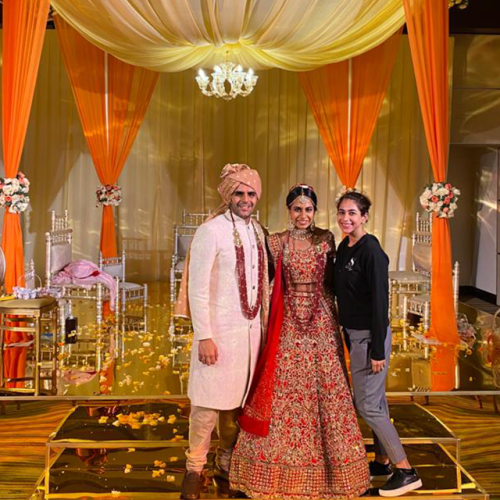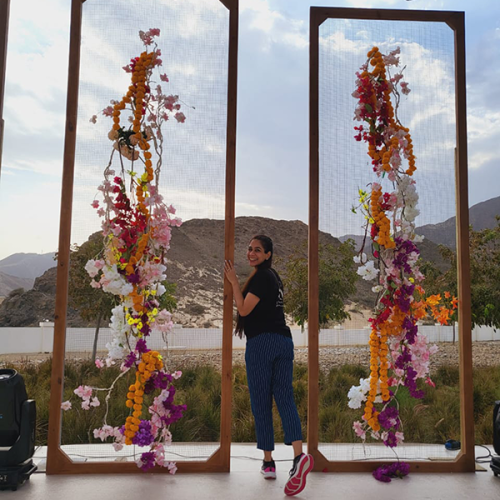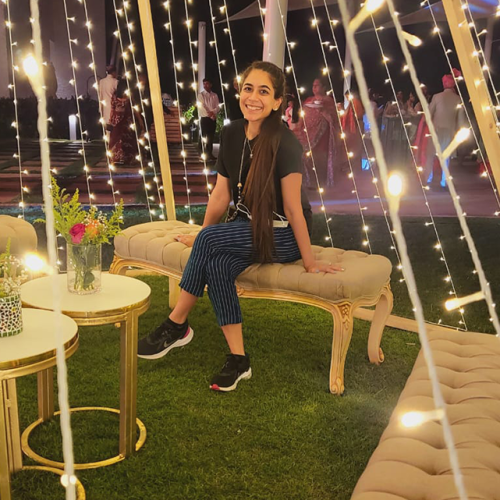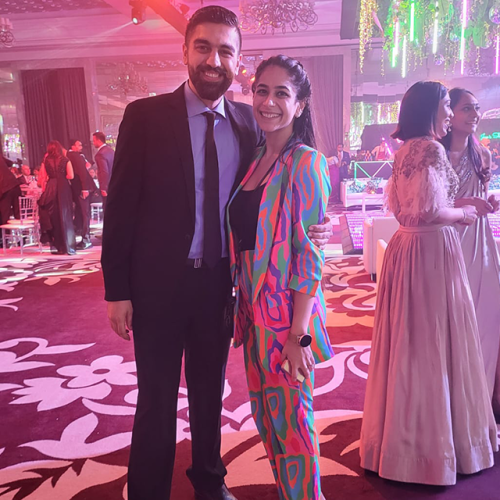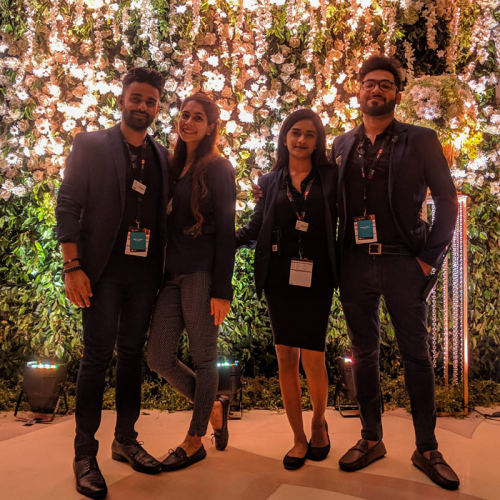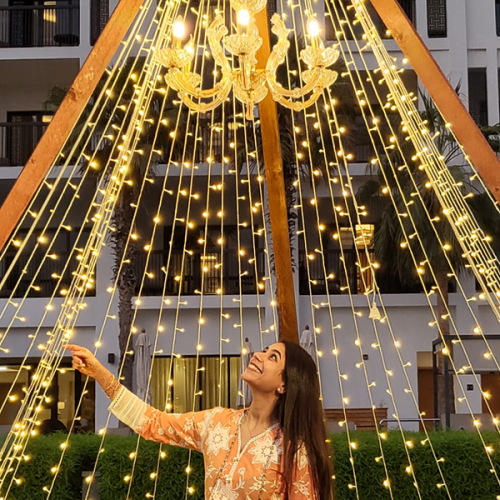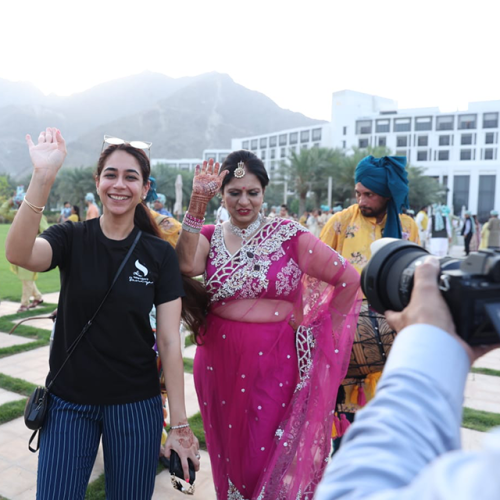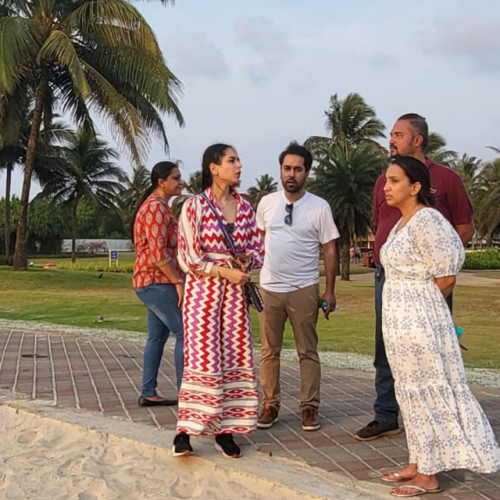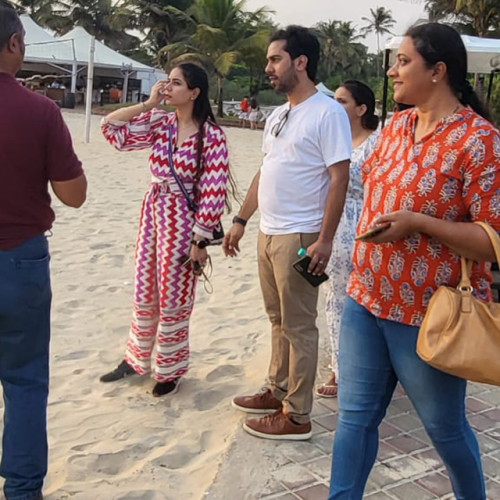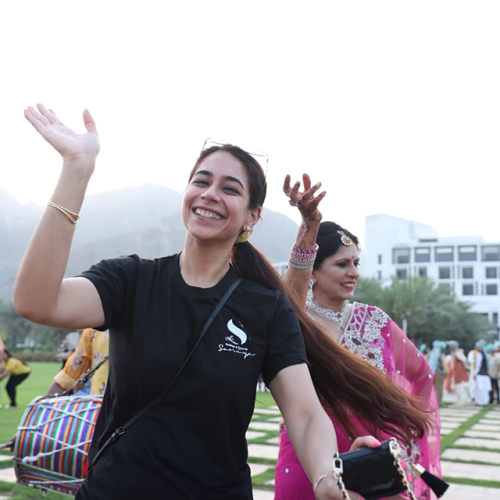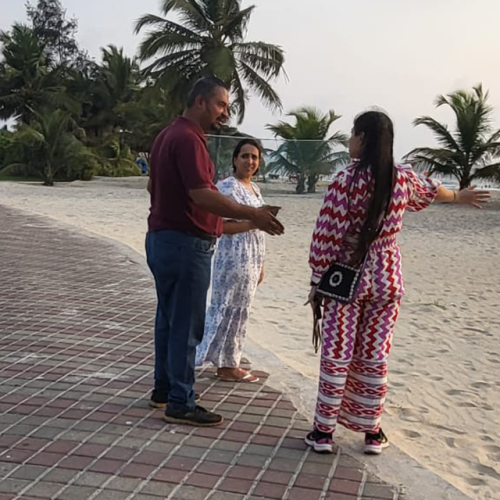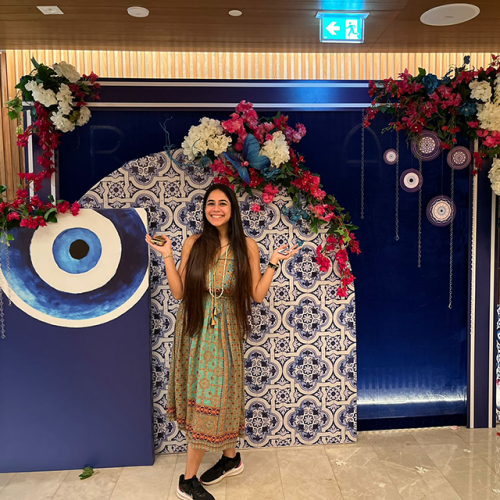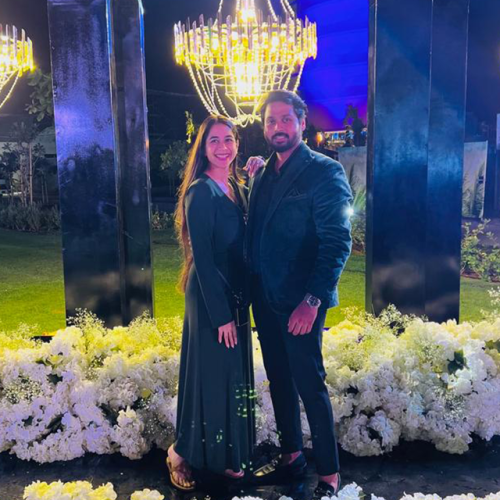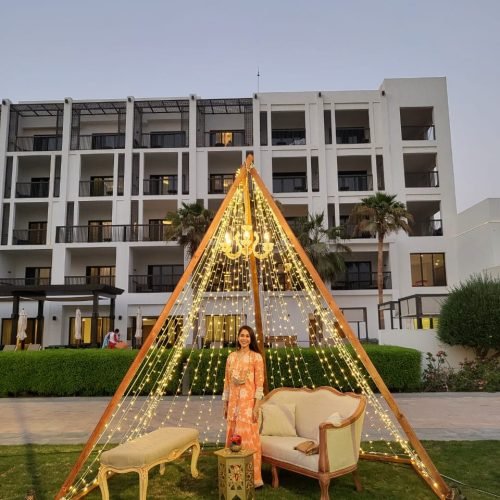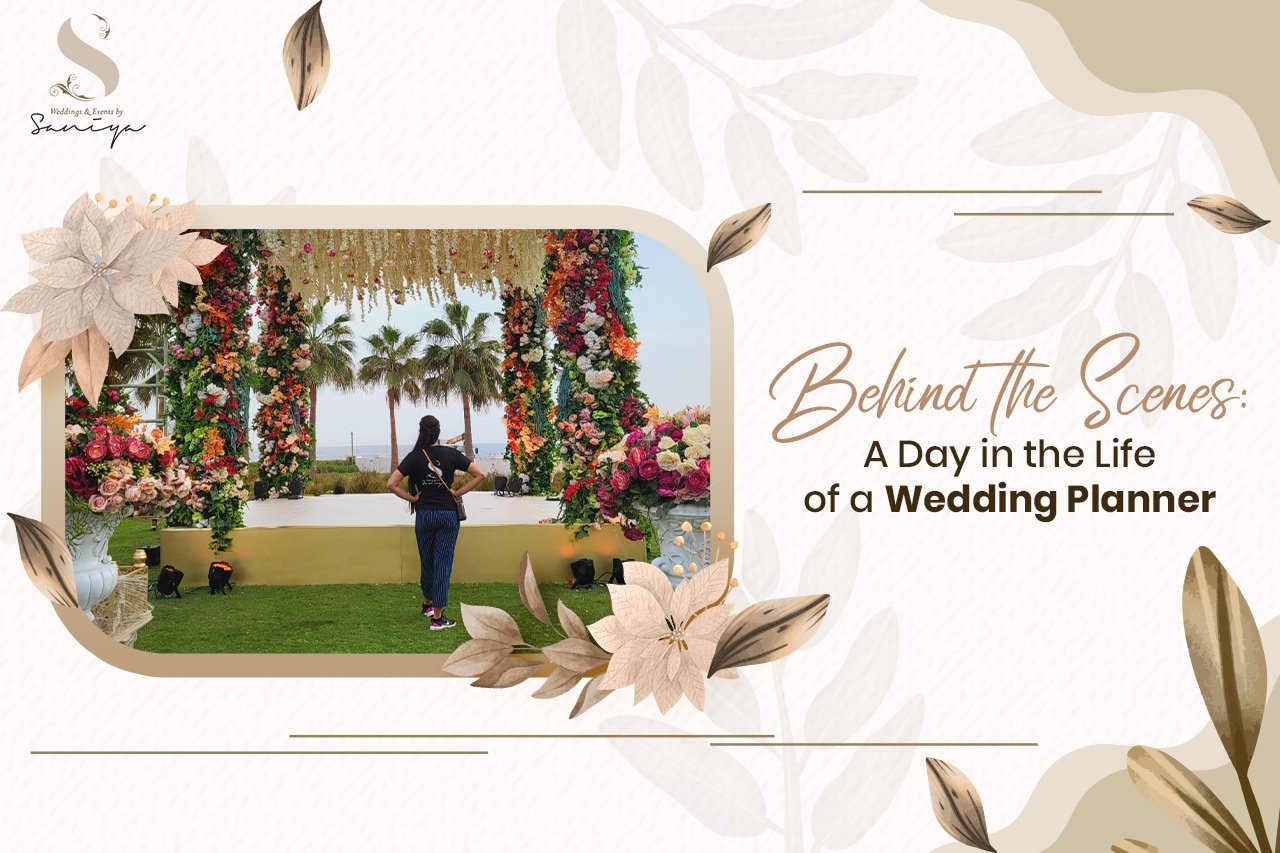
09 Jun Behind the Scenes: A Day in the Life of a Wedding Planner
I am sure you all have attended a memorable wedding. What made it so memorable for you? Was it the decor? The food? The costumes? The shows? Even to make that one aspect memorable, the wedding planner had to go into micro-minute details to create that perfect picture. Have you ever wondered how an event planner plans a complex and multi-faceted event? A job that requires an almost impossible combination of creativity, organization, and attention to detail. Right from meeting with clients and coordinating vendors to designing the look and feel of the wedding, there isn’t a dull moment in the life of a wedding planner. Let us take a peek into a day in the life of a wedding planner to understand what goes on behind the scenes.
When it comes to planning a dream wedding, the expertise and dedication of a skilled wedding planner can make all the difference. In the bustling city of Dubai, one name stands out among the rest: Saniya Wahi of the Events by Saniya (EBS) fame. As a renowned event planner in Dubai, Saniya has earned a stellar reputation for her impeccable attention to detail, creativity, and ability to bring couples’ visions to life. With her expertise and passion for creating unforgettable experiences, Saniya has established herself as one of the best wedding planners in the UAE.
Dubai, known for its luxury and opulence, attracts couples from around the world seeking a truly extraordinary wedding celebration. Amidst the grandeur and splendor, team- Events by Saniya excel in curating bespoke weddings that exceed expectations. From intimate ceremonies to extravagant affairs, Saniya’s meticulous planning and flawless execution have earned her the trust of countless couples.
As the best wedding planner in UAE, EBS offers a comprehensive range of wedding services in Dubai. Their expertise extends beyond logistical coordination to encompass every aspect of the wedding experience. From selecting the perfect venue to designing exquisite decor, coordinating with top-notch vendors, managing budgets, and ensuring seamless execution, Saniya and her team leave no stone unturned.
EBS not only stands as a premier wedding planning agency but is also recognized as a top event management company in Dubai. Their commitment to excellence, attention to detail, and unparalleled creativity have positioned them at the forefront of the event management industry. Saniya Wahi’s innovative approach and her team’s unwavering dedication make EBS the go-to choice for couples seeking a remarkable wedding experience.
In this article, we will take you behind the scenes and provide a glimpse into a day in the life of Saniya Wahi, the celebrated wedding planner in Dubai. We will explore the intricate details, challenges, and rewarding moments that come with being the best in the industry. From early morning meetings to late-night brainstorming sessions, Saniya’s unwavering commitment to her clients and her passion for creating extraordinary events shine through every step of the way.
So join us as we delve into the world of Events by Saniya, and gain insights into the artistry, dedication, and expertise that makes her the best.
A wedding planner’s routine depends on what stage of the wedding it currently is. Whether it is a discussion with a client to close a wedding contract or being at the event itself, handling all the unexpected hitches and ensuring that everything moves like clockwork; the routine of the day can vary wildly. However, one thing remains constant, and that is how hectic and exhausting a day in the life of a wedding planner is!
The morning begins very early as the planner checks messages and emails, squinting through the forever inadequate sleep. This morning check is crucial as it sets the tasks to be prioritized for the day. On a day when there is no wedding to look into, the planner has a series of meetings. The usual meetings are with clients, vendors, and design tasks.
The most crucial meeting is with Clients: A wedding planner needs to take every interaction with the client as an opportunity to know the clients, understand their vision for their wedding, and discuss their budget. They need to ask questions about their likes and dislikes, as well as their expectations for the big day, and provide guidance on vendors, venues, and design elements to help bring their vision to life.
The next item on the planner’s to-do list is to connect with vendors. Communicating with vendors throughout the planning process is imperative to make sure everything is running smoothly. The planner needs to constantly check in with vendors to ensure they have all the necessary information they need to execute their tasks. And frequently, a wedding planner has to be ready to troubleshoot any issues that arise, such as a vendor being unavailable on the wedding day.
Also Read: Creating the Perfect Wedding Day Timeline: A Step-by-Step Guide
Design Planning is another aspect of a wedding planner’s day. This is one of the more creative parts of the job and involves designing the overall look and feel of the wedding. You’ll need to select colors, themes, floral arrangements, table settings, and other design elements that will be used throughout the wedding. You may need to create a design board or visual aid to help the clients visualize the final look.
Budgeting is the trickiest part. Wedding planners must work within the client’s budget to ensure that the event is financially feasible. Typical of clients, they expect the moon and a planner is committed to putting in every effort to stretch and make ends meet. Keeping track of all expenses and making sure that the budget is not exceeded is indeed a tiring job with unending negotiations with vendors to get the best possible price.
There is the maddening back and forth where they spend a lot of time communicating with vendors, clients, and other stakeholders involved in the wedding planning process. You’ll need to make appointments, send emails, and make phone calls to ensure that everything is up to expectations and runs smoothly. You may also need to create timelines, review contracts, and other administrative documents.
The hectic bit reaches a crescendo as the wedding day approaches. This is when every planner wishes to have more than 24 hours in a day. As the wedding day approaches, you’ll need to make sure that everything is in place. This may involve coordinating the rehearsal dinner, setting up the venue, and confirming the timeline with all vendors involved. You’ll also need to create a contingency plan for any last-minute issues that may arise.
On the Wedding Day, the big day, the wedding planner is literally on tenterhooks. Everything has to run smoothly without a hiccup. The various vendors, guests and the bride and groom need to be happy and relaxed even if the planner is in the midst of a tornado of activities happening simultaneously. It is their responsibility to make sure that all the ceremonies, reception, and other events go according to plan and timelines.
Once the wedding is over, the event planner heaves a sigh of relief at an event that has concluded. But, this respite is momentary. After the wedding is over, you’ll need to close out the books, reconcile invoices, and send thank-you notes to everyone who helped make the day special. You’ll also need to conduct a post-event review to evaluate how everything went and identify areas for improvement.
Being a wedding planner is no cakewalk! It involves a lot of hard work and attention to detail and balancing people’s egos and eccentricities to create an event that is a milestone in a couple’s life! It’s a challenging job, but it is very rewarding to see happy clients and as they gush their happiness and pour their blessings on the wedding planner, the planner feels rewarded and satisfied that their client’s vision of their special day came to life and became a memory of a lifetime!
As a wedding planner in Dubai, Saniya Wahi of EBS is known for her expertise and dedication to creating unforgettable wedding experiences. With a comprehensive range of wedding services in Dubai, EBS stands out as the top event management company in Dubai. Whether you are looking for a wedding planner in Dubai, wedding planner Dubai, wedding planners UAE, or the best wedding planner in UAE, Saniya Wahi and her team at EBS are the go-to choice.
Frequently Asked Questions
Q1. What is the daily life of a wedding planner?
The daily life of a wedding planner can be dynamic and varied, depending on the stage of the wedding planning process and the specific tasks at hand. Here’s an overview of what a typical day in the life of a planner may look like:
- Morning Routine: The day usually begins early for a wedding planner. They may start by checking messages, emails, and reviewing the schedule for the day. This helps set the priorities and tasks to be accomplished.
- Client Meetings: One of the essential aspects of a wedding planner’s day is meeting with clients. These meetings provide an opportunity to understand the couple’s vision for their wedding, discuss their preferences, and align their expectations. Wedding planners need to ask detailed questions, offer guidance on various aspects of the wedding, and provide recommendations on vendors, venues, and design elements.
- Vendor Communication: Wedding planners need to maintain regular communication with vendors throughout the planning process. They ensure that vendors have the necessary information, address any queries or concerns, and coordinate logistics. This includes reviewing contracts, negotiating prices, and troubleshooting any issues that may arise.
- Design Planning: A significant part of a wedding planner’s day involves designing the overall look and feel of the wedding. This includes selecting color schemes, themes, decor elements, floral arrangements, table settings, and more. Wedding planners may create design boards or visual aids to help clients visualize the final outcome.
- Budget Management: Managing the budget is a crucial responsibility for a wedding planner. They need to work within the client’s budget while ensuring that all aspects of the wedding are financially feasible. Wedding planners keep track of expenses, negotiate with vendors for the best prices, and ensure that the budget is not exceeded.
- Administrative Tasks: Wedding planners spend a considerable amount of time on administrative tasks. This includes making appointments, sending emails, making phone calls, creating timelines, and reviewing contracts and other necessary documents. They also handle logistical coordination, such as scheduling appointments for venue visits or vendor meetings.
- Wedding Day Coordination: As the wedding day approaches, the wedding planner’s focus shifts to ensuring that everything is in place for the event. This involves coordinating the rehearsal dinner, overseeing the setup of the venue, confirming timelines with vendors, and addressing any last-minute issues or changes. On the wedding day itself, the wedding planner is present to ensure that all ceremonies, reception, and other events run smoothly according to the plan.
- Post-Event Tasks: After the wedding, the wedding planner’s work is not entirely complete. They need to wrap up various tasks, including closing financial accounts, reconciling invoices, and sending thank-you notes to vendors and others who contributed to the event’s success. Wedding planners also conduct post-event reviews to evaluate the overall execution and identify areas for improvement.
It’s important to note that the daily routine of a wedding planner can be highly flexible and may vary depending on the specific demands of each client and the stage of the wedding planning process. They often juggle multiple weddings simultaneously, requiring exceptional organizational skills, attention to detail, and the ability to manage time effectively.
Q2. What is the hardest part of being a wedding planner??
Being a wedding planner comes with its unique challenges, and the hardest part can vary depending on individual experiences. However, here are some common aspects that they often find challenging:
- Managing High Expectations: Couples often have high expectations for their wedding day, and it’s the wedding planner’s responsibility to meet or exceed those expectations. Balancing the couple’s vision, budget constraints, and logistical realities can be a daunting task. Ensuring that every detail is executed flawlessly and creating a memorable experience can be a significant challenge.
- Dealing with Stressful Situations: Weddings are complex events with numerous moving parts, and unexpected issues can arise at any moment. Wedding planners need to handle these situations calmly and find quick solutions while maintaining the overall flow of the event. Dealing with demanding clients, demanding vendors, or last-minute changes can add significant stress to the job.
- Time Management: Wedding planners often work on multiple weddings simultaneously, each with its unique timeline and requirements. Juggling multiple tasks, appointments, and deadlines can be overwhelming. It requires excellent time management skills and the ability to prioritize effectively to ensure everything is on track.
Negotiating and Budgeting: Working within the client’s budget while delivering their desired vision can be challenging. Wedding planners often need to negotiate with vendors to get the best possible prices and manage expenses to avoid exceeding the budget. Balancing cost considerations with quality and ensuring that the couple’s expectations are met can be a delicate task.
Long and Irregular Hours: Wedding planning involves working during weekends, evenings, and holidays when events are taking place. It often requires long hours, especially during peak wedding season. Wedding planners need to be prepared for the physical and mental demands of the job, including being on-site during the event to ensure its smooth execution.
Handling Emotional Situations: Weddings are emotionally charged events, and tensions can run high among family members, couples, or even vendors. Wedding planners often find themselves mediating conflicts, managing personalities, and navigating delicate situations. Maintaining a professional and calm demeanor while addressing emotional issues can be challenging.
Attention to Detail: Wedding planning requires meticulous attention to detail. From contracts and timelines to decor elements and vendor coordination, even the smallest oversight can have significant consequences. Wedding planners must be highly organized and thorough in their work to ensure nothing falls through the cracks.
Despite these challenges, many wedding planners find the rewards of their work to be incredibly fulfilling. The ability to create magical moments, witness the joy of couples, and bring their vision to life can make all the hardships worthwhile. Adaptability, problem-solving skills, and a passion for weddings are vital for overcoming challenges and succeeding in the wedding planning industry.
Q3. What does a wedding planner do?
A wedding planner is responsible for coordinating and organizing all aspects of a wedding, from meeting with clients and vendors to designing the look and feel of the event. They ensure that everything runs smoothly and according to the client’s vision.
Q4. How does a wedding planner work with clients?
A wedding planner works closely with clients to understand their preferences, budget, and expectations for their big day. They ask questions, provide guidance, and offer recommendations on vendors, venues, and design elements to bring the client’s vision to life.
Q5. How does a wedding planner manage the budget?
Budgeting is a crucial aspect of a wedding planner’s role. They work within the client’s budget to ensure that the event is financially feasible. This involves tracking expenses, negotiating with vendors, and finding creative ways to stretch the budget without compromising the quality of the wedding.
Q6. What is involved in the design planning process?
Design planning is a creative part of the wedding planner’s job. They select colors, themes, floral arrangements, table settings, and other design elements to create the overall look and feel of the wedding. They may use design boards or visual aids to help clients visualize the final result.
Q7. What happens on the wedding day?
On the wedding day, the wedding planner is responsible for ensuring that everything runs smoothly. This includes coordinating with vendors, setting up the venue, and confirming timelines. They handle any last-minute issues that may arise and ensure that all ceremonies, receptions, and events go according to plan.


